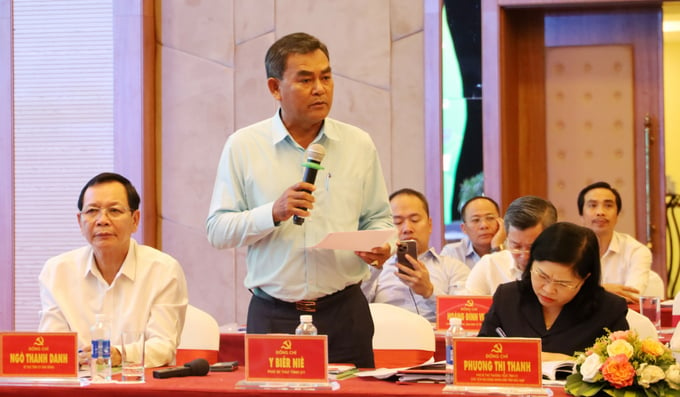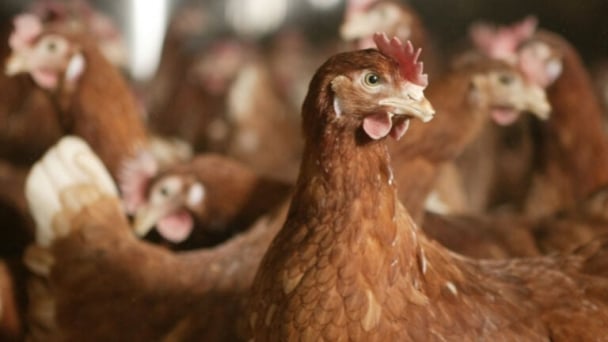June 27, 2025 | 15:11 GMT +7
June 27, 2025 | 15:11 GMT +7
Hotline: 0913.378.918
June 27, 2025 | 15:11 GMT +7
Hotline: 0913.378.918

“Dak Lak has a lot of potentials to develop green and sustainable ago-forestry economy associated with forest management and protection, but there are still many difficulties and obstacles,” said Mr. Y Bier Nie, Deputy Secretary of Dak Lak Provincial Party Committee. Photo: Quang Yen.
On April 4, the Central Economic Commission and Ministry of Agriculture and Rural Development coordinated with Dak Lak Provincial Party Committee to organize a workshop on green and sustainable agro-forestry economic development in the Central Highlands associated with forest management, protection and development.
At the workshop, Mr. Ho Van Muoi, Chairman of Dak Nong Provincial People's Committee, said that despite the achieved results in sustainable agricultural and forestry economic development associated with forest management and protection, the Central Highlands still met with many limitations and difficulties. Investment attraction for agro-forestry production and forest management is not sustainable. The new forest economic activities are in their initial stage, the achieved results have yet to leave a clear impact.
“In order to develop the agro-forestry economy to improve people’s incomes, stabilize their lives, and increase revenue for forest owners, Dak Nong People's Committee proposed to continue maintaining the policy of payment for forest environmental services, promote the forest’s strengths through forest environment leasing programs. All levels need to gradually participate in building databases and regulatory corridors to access the carbon market," said Mr. Muoi.

Deputy Minister of Agriculture and Rural Development Nguyen Quoc Tri co-chaired the workshop. Photo: Quang Yen.
The Dak Lak Master Plan for the 2021 - 2030 period, vision to 2050 identifies fast, sustainable and comprehensive socio-economic development based on 4 main growth pillars: Large-scale development of high-quality advantageous agro-forestry products for large export; Agro-forestry-fishery processing industry and large-scale renewable energy production; Urban economic development, digital infrastructure, irrigation infrastructure; Services - logistics - tourism development based on digital platforms, digital economy, digital society adaptive to climate change.
Mr. Y Bier Nie, Deputy Secretary of the Dak Lak Provincial Party Committee, said, “Dak Lak suggests that the central authorities, experts, organizations and individuals properly assess the current situation and clearly identify the difficulties and problems of Dak Lak in particular and the Central Highlands in general. From there, provide orientations and policies to solve the existing problems of the whole region, especially those related to economic development as well as forest management and protection.”
The Central Highlands region currently has more than 2.5 million ha of forest, accounting for 17.45% of Vietnam’s forest area. This is the area with the second largest watershed forest area in the country with the average revenue from forest environmental services reaching VND 912 billion/year.

The Central Highlands hold many advantages to participating in the carbon credit trading market. Photo: Quang Yen.
Mr. Tran Quang Bao, Deputy Director of the Administration of Forestry (MARD), said that the Central Highlands had a lot of potential for forest environmental services but has not been exploited, such as natural disaster prevention services (wind fences, flying sand block and wave breakers) or flash flood prevention services to protect irrigation works in upstream areas. These functions of the forest need to be further studied and quantified into a money source as a basis for formulating the policy of payment for forest environmental services.
There are different measures to reduce greenhouse gas emissions. Considering the conditions of Vietnam, enhancing the carbon sequestration and storage capacity of forests through forest protection, forest restoration, afforestation and sustainable forest management can be considered an important and appropriate solution.

Mr. Tran Tuan Anh, Politburo member, Head of the Central Economic Commission delivered the closing speech. Photo: Quang Yen.
Speaking at the end of the workshop, Mr. Tran Tuan Anh, Politburo member, Head of the Central Economic Commission asked localities and branches to perform 4 main tasks:
First, review, amend, supplement and complete policies and laws on the management and use of forestry land in the Draft Land Law;
Second, improve the effectiveness of the policy of payment for forest environmental services and sustainable development solutions for forest environmental services in the future; perfect mechanisms and policies for the carbon credit market in Vietnam;
Third, specifically set out the tasks and possible solutions in the work of ensuring security for people living in forested areas;
Fourth, make full use of the potential of the Central Highlands based on the 4 main growth pillars to successfully implement Resolution No. 23-NQ/TW of the Politburo and the experience in green transformation and digital technology in the agricultural sector to adapt to climate change.
Translated by Samuel Pham

(VAN) Research has shown that Hy-Line brown hens may be better suited for cage-free production based on overall greater egg production and other quality metrics.
![Turning wind and rain into action: [9] Digitizing hydrometeorological data in response to climate change](https://t.ex-cdn.com/nongnghiepmoitruong.vn/608w/files/news/2025/06/17/z6704423696987_15fd32ffc26d590d204d520c9dac6786-nongnghiep-165943.jpg)
(VAN) Farmers have begun accessing hydrometeorological applications to adjust their cropping schedules, aiming to ensure productivity and adapt to climate change.
![Turning wind and rain into action: [8] Real-time salinity detection and early warning technology](https://t.ex-cdn.com/nongnghiepmoitruong.vn/608w/files/news/2025/06/17/z6704423696987_15fd32ffc26d590d204d520c9dac6786-nongnghiep-151127.jpg)
(VAN) Thanks to the integration of modern hydrological-hydraulic models, remote sensing technologies, and artificial intelligence, the accuracy of hydrological forecasting has significantly improved.
![Turning wind and rain into action: [7] Early disaster warnings help marine farmers minimize losses](https://t.ex-cdn.com/nongnghiepmoitruong.vn/608w/files/news/2025/06/17/z6704423696987_15fd32ffc26d590d204d520c9dac6786-nongnghiep-142942.jpg)
(VAN) In recent years, thanks to early disaster warnings and forecasting, marine farmers in Khanh Hoa province have been able to reduce risks and losses, thereby improving production efficiency.
![Turning wind and rain into action: [6] ‘Four on-the-spot’ disaster management software](https://t.ex-cdn.com/nongnghiepmoitruong.vn/608w/files/news/2025/06/17/e5a48259d6a262fc3bb3-nongnghiep-183800.jpg)
(VAN) By simply activating the scenario on the disaster management software, the relevant authorities immediately know how many households need to be evacuated, where to evacuate them to, and by what means of transportation…
![Turning wind and rain into action: [5] Hue applies modern technology in disaster forecasting](https://t.ex-cdn.com/nongnghiepmoitruong.vn/608w/files/news/2025/06/17/z6704423696987_15fd32ffc26d590d204d520c9dac6786-nongnghiep-093938.jpg)
(VAN) In Hue city, modern technology has recently been applied in meteorological and hydrological forecasting and warning, helping to reduce the damage caused by natural disasters.

(VAN) A cutting-edge farming technique being implemented on an experimental ranch in Arizona's Sonoran Desert has already saved a billion gallons of water over five years, according to Civil Eats.